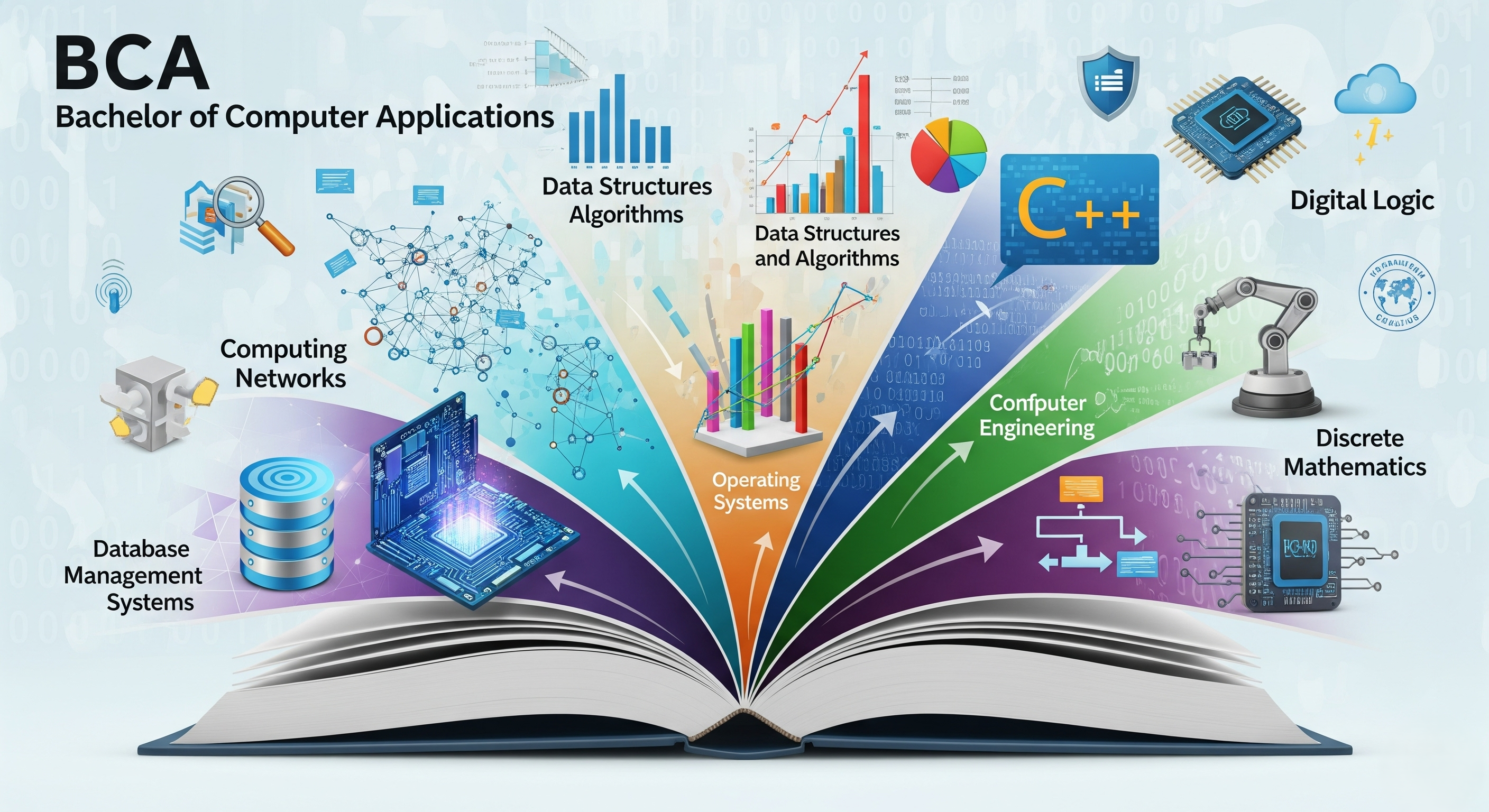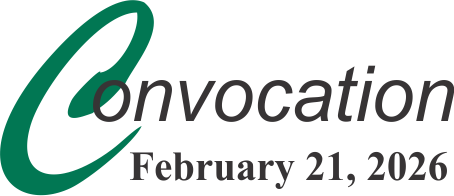
How Many Subjects in BCA and What You Need to Know *
Before you enrol in BCA, it’s natural to ask what exactly you will study. The BCA course subjects cover a wide range of topics, so you don’t just learn programming and databases but also get exposure to networking, mathematics, business concepts and communication skills. The BCA syllabus is structured in a way that balances theory with real-world practice, so by the time you finish, you’ll have both understanding and experience. Knowing the subjects in BCA early on also helps you prepare yourself for what’s ahead.
This guide is here to make things simple. Whether you’re a student just out of 10+2, someone thinking of changing careers or even just curious about the scope of BCA courses, you’ll find everything you need to get a clear picture. By the end, you’ll know what the course includes and how it can open doors to exciting opportunities in the tech world.
Core Subjects in BCA Which Are Taught By Reputed Institutions
The BCA course subjects are designed to give you a strong base in computer applications and IT concepts, so you can start building practical skills while understanding the fundamentals of technology. The core subjects cover a variety of areas to prepare you for higher studies or entry-level roles in software, networking, web development, and digital solutions.
Here’s a simple overview of the core subjects and why they matter:
Subject Category |
Key Topics |
Importance |
|---|---|---|
| Programming Languages | C, C++, Java, Python | Helps develop logical thinking and problem-solving which is essential for software development |
| Database Management Systems (DBMS) | Concepts, SQL | Teaches how to manage and organise data efficiently for IT systems |
| Data Structures & Algorithms | Arrays, Linked Lists, Trees, Searching & Sorting | Important for solving programming problems and writing optimised code |
| Operating Systems | Fundamentals, Types of OS | Explains how software interacts with hardware and runs smoothly |
| Computer Networks | Basics, Protocols | Introduces networking concepts needed for data transfer and communication |
| Web Technologies | HTML, CSS, JavaScript, Introduction to server-side | Lets you create dynamic websites and understand web applications |
| Mathematics & Statistics for IT | Discrete Mathematics, Probability | Supports logical reasoning, algorithms, and data analysis |
| Software Engineering | Software development life cycle, methodologies | Shows structured ways to build quality software projects |
| Computer Fundamentals & Organisation | Hardware, Software basics | Gives a clear understanding of how computer systems work |
Details of the Semester-Wise BCA Course Subjects
The exact syllabus can vary slightly depending on the university, but most courses follow a similar structure covering programming, networking, web technologies, mathematics, and practical projects over six semesters. The semester-wise breakdown helps you understand how your learning builds gradually from basics to advanced topics while giving flexibility for electives and specialised subjects.
Year 1 (Semester 1 & 2)
Subject |
Focus Area |
|---|---|
| Introduction to Programming (C/C++) | Introduces programming concepts, logical thinking, and problem-solving |
| Basic Mathematics for Computers | Covers foundational maths and reasoning skills essential for computing |
| Digital Electronics | Focuses on basics of digital circuits and understanding computer hardware |
| Computer Fundamentals | Provides knowledge of hardware, software, and system components |
| Communication Skills | Enhances written and verbal communication for IT professionals |
| Data Structures | Teaches organisation and efficient management of data |
| Database Management Systems (DBMS) | Introduces database design and SQL for managing data |
| Operating Systems | Covers basics of OS and how software interacts with hardware |
Year 2 (Semester 3 & 4)
Subject |
Focus Area |
|---|---|
| Object-Oriented Programming (Java) | Explains advanced programming concepts, classes, and objects |
| Computer Networks | Introduces networking concepts, protocols, and communication systems |
| Software Engineering | Covers software development life cycle and methodologies |
| Web Technology (HTML, CSS, JS) | Teaches building interactive websites and basic server-side concepts |
| Statistical Methods | Applies probability and statistics to computing problems |
| Financial Management | Provides basic financial knowledge relevant to IT projects |
| Elective 1 (Python Programming) | Optional subject for additional programming skills |
Year 3 (Semester 5 & 6)
Subject |
Focus Area |
|---|---|
| Advanced Java/Python/PHP | Covers advanced coding and application development |
| E-commerce | Explains online business models and digital transactions |
| Cyber Security | Introduces concepts for protecting systems and networks |
| Mobile Application Development | Teaches app development for Android and iOS platforms |
| Cloud Computing | Covers cloud platforms, services, and deployment concepts |
| Project Work/Internship | Provides practical experience and real-world application |
| Elective 2 (Data Science Basics / Machine Learning Intro) | Optional advanced skill-based subject for modern IT applications |
Specific subjects may vary depending on the institution. Some universities may also offer electives like Data Mining, Blockchain Technology, or Game Development in later semesters. Learning these subjects in BCA ensures you have a strong foundation that gradually builds towards specialised skills and practical experience, preparing you for a career in IT.
Electives and Specialisations in BCA Courses
Many BCA-offering institutions give you the flexibility to choose electives in later semesters, letting you focus on areas that match your interests and career goals. The BCA subjects in the elective category help you gain specialised skills and prepare for in-demand roles in the IT industry.
Specialisation / Elective |
Focus Area |
Why It Matters |
|---|---|---|
| Mobile Application Development (Android/iOS) | Designing and developing apps for mobile platforms | Helps you enter the growing mobile app industry and learn practical app development skills |
| Web Development (Full Stack) | Front-end and back-end web technologies | Prepares you for careers as web developers and full-stack programmers |
| Cloud Computing | Cloud platforms, services, and deployment | Builds knowledge for roles in cloud management and DevOps |
| Cyber Security | Protecting systems, networks, and data | Essential for careers in cybersecurity and IT risk management |
| Data Science & Analytics | Data processing, analysis, and visualisation | Opens opportunities in data analytics, business intelligence, and AI-related fields |
| Artificial Intelligence & Machine Learning | Basics of AI, ML algorithms, and applications | Prepares you for emerging roles in AI, machine learning, and smart systems |
| Game Development | Designing and developing games | Combines programming with creativity for roles in the gaming industry |
BCA Eligibility, Admissions, Careers, and Skills
To succeed after BCA, it’s important to know what comes beyond the subjects in BCA. This includes eligibility, admission process, career opportunities, and essential skills that will help you grow in the IT industry.
Requirement |
Details |
|---|---|
| Educational Qualification | Completion of 10+2 (any stream) with a minimum of 45–50% marks from a recognised board |
| Subject Requirements | Mathematics, Computer Applications, or English as a core subject in 10+2 |
| Age Limit | Typically, a minimum age of 17 years; some institutions may have upper age limits |
| Reserved Category Relaxation | A relaxation of 5% marks for candidates belonging to SC, ST, and OBC categories |
Note: Specific eligibility criteria may vary by institution.
Admission Process
Method |
Details |
|---|---|
| Merit-based | Admission based on 10+2 marks or the cut-off criteria of the university |
| Entrance Exams | Some universities conduct/accept scores of reputed entrance tests covering aptitude, reasoning, and basic computer knowledge. Key exams include IPU CET, SET, CUET, and AIMA UGAT |
Career Prospects After BCA
Job Role |
Description |
|---|---|
| Software Developer / Engineer | Designing, coding, and maintaining software applications |
| Web Developer | Building and maintaining websites and web applications |
| Database Administrator | Managing databases, ensuring security and efficiency |
| System Administrator | Maintaining IT infrastructure and servers |
| Network Engineer | Handling networking systems, protocols, and connectivity |
| Quality Assurance Engineer | Testing software for bugs and ensuring quality |
| IT Support Specialist | Providing technical support and troubleshooting |
| Further Studies | Pursuing higher education like MCA, MBA, or M.Sc. in IT to enhance skills |
Essential Skills Beyond Academics
Skill |
Why It Matters |
|---|---|
| Problem-solving | Helps tackle technical challenges efficiently |
| Logical Reasoning | Strengthens programming and analytical capabilities |
| Analytical Thinking | Useful for data interpretation, debugging, and decision-making |
| Communication Skills | Important for collaboration, client interaction, and documentation |
| Continuous Learning / Adaptability | Keeps you updated with evolving technologies |
| Teamwork | Essential for project collaboration and professional success |
Understanding these aspects beyond the course subjects ensures you are well-prepared for admissions, career growth, and building a strong skill set to succeed in IT careers.
Conclusion
Understanding the complete BCA syllabus is more than just knowing what you will study each semester. It helps you plan your learning, choose the right electives, and build skills that are in demand in the IT industry. From programming languages to database management, networking, and specialised electives, each BCA course subject plays a role in shaping your foundation and preparing you for real-world challenges.
The great thing about BCA courses is that they give you a solid foundation while keeping your career options flexible. You can step into roles like software developer, web developer, network engineer, or even pursue higher studies like MCA or MBA. Knowing the course subjects well also helps you understand which area excites you the most, so you can focus on your strengths and interests.
FAQs


